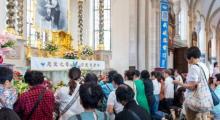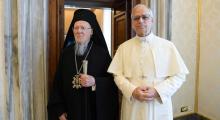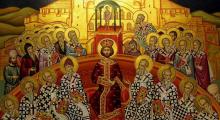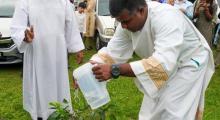Issued by the Catholic Center for Studies and Media - Jordan. Editor-in-chief Fr. Rif'at Bader - موقع أبونا abouna.org
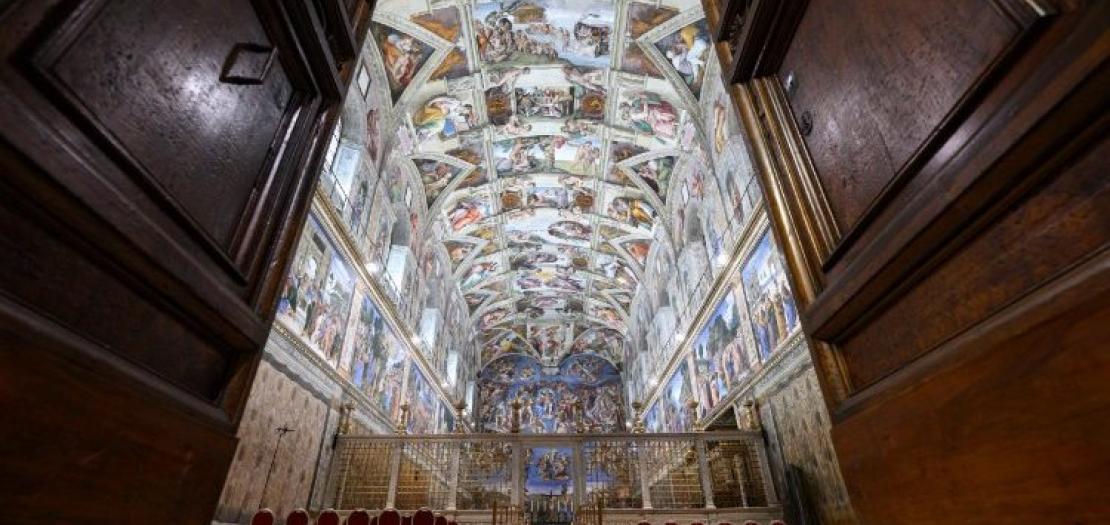
The Sistine Chapel, now prepared for the Conclave
Extra omnes. All out.
It happens, in this suspended time, that everyone in the world is wondering who will be the 267th bishop of Rome. All are involved, even if physically excluded from the place where a group of the successors of the apostles, gathered in a chapel, will choose the servant of the servants of God.
A servant. A servant of the one People of which Peter was and continued to be a part, even after being called to lead it.
A servant. And here is the mystery. How can a servant be the head of a people? Of a Church?
This is a question which Jesus answered in words that we still struggle to understand today: "You know that those who are thought to be leaders of the nations lord it over them, and their great ones exercise power over them. But among you it is not so; but whoever wishes to be great among you shall be your servant, and whoever wishes to be first among you shall be servant of all. For the Son of Man came not to be served, but to serve, and to give his life as a ransom for many". (Mark 10:42-45)
To serve, then. This is what Peter's successors are called to in order to lead the Church. And this paradox disorients. It confuses both the media and the many centers of power, both large and small, who rack their brains over the identity and the name that will be taken by whoever is elected, and perhaps even try to influence the decision, drawing up scenarios and interpretations that appear to be written in the sand.
Extra omnes. This rule disrupts this time between the now and the not-yet in which even the cardinals are called to enter the mystery; and to leave not just everyone, but everything outside the Sistine Chapel: hence themselves, their thoughts, their reasoning; and to empty themselves totally to leave space only for the Spirit, for a dynamic that transcends them, and for the mystery of Peter.
But this is Peter. A mystery that entrusts us with a certainty.
Peter is the fisherman whom Jesus said that evil would not overcome: "You are Peter, and on this rock I will build my church, and the gates of hell will not prevail against it". (Matthew 16:18)
He is the Apostle for whom - in entrusting his Church to him - the Son of God prayed with a special recommendation to the Father. That he might support him in carrying on his shoulders an otherwise too great burden.
Peter is a man sustained by this prayer, which has extended through time and history through his successors to reach us today. A concrete prayer, special in fact: a prayer that faith would never fail in the face of the trials he would have to face, so different and so similar to those of our own time, secularized, divided, polarized, confused, incensed; full of a desire for command and lacking in love, incapable of understanding the value of service and the common good, swollen with fragile certainties and false truths, imbued more with rancor than with mercy, so often desirous more of revenge than of forgiveness: "Simon, Simon, behold, Satan has sought you out to sift you like wheat; but I have prayed for you, that your faith may not fail. And you, once converted, confirm your brothers". (Luke 22:31-32)
Peter is a mystery of mercy and love; of communion and listening.
A fisherman who makes a mistake in his calculations; who stands, disturbed, all night at sea without catching a single fish; who then casts his net on the other side, on the word of a stranger. And who finally understands that the speaker is his Lord.
Peter is a forgiven sinner: He is the chosen one who, before rejoicing, wept bitterly after betraying Jesus. Like Judas. But he weeps. He wept.
In his tears lies his mystery. And there is the mystery of the Church. Those tears are perhaps the keys to the Kingdom. They are the keys of Peter and of his mystery: a fragility that is powerful precisely because he does not shine with his own light. A rock even if he was not. Confirming us all in the faith.



